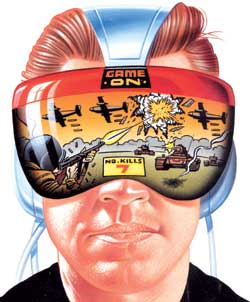 Passing into post-traumatic stress, the United States of America has fallen for the coping mechanism of waging war on an enemy whose threat it has massively magnified. Its military buildup in the Gulf and Central Asia portends the mother of all battles. But all this sabre-rattling seems aimed more at a domestic audience than the Al Qaida fugitives of Osama bin Laden last seen in Afghanistan.
Passing into post-traumatic stress, the United States of America has fallen for the coping mechanism of waging war on an enemy whose threat it has massively magnified. Its military buildup in the Gulf and Central Asia portends the mother of all battles. But all this sabre-rattling seems aimed more at a domestic audience than the Al Qaida fugitives of Osama bin Laden last seen in Afghanistan. No nation, not even a superpower or a military alliance like NATO can guarantee peace in a world plagued by increasing inequality and a vicious cycle of poverty, exploitation and injustice. The sole superpower of the globe may have reduced the United Nations to the level of a "supra-national relief agency" as an American scholar put it disparagingly, but it still is the last hope of turning the world into a community of nations.
What is true of relationship between nations is equally valid for interdependence between different communities within a state. The moment a single community, or an alliance of dominant communities, decides to perpetuate the hold on power then the seeds of sedition are sown. In a functioning democracy, the state is expected to mediate in the conflict of interest between communities that have contradictory aspirations and differing grievances. The moment a state stops discharging that function of mediation, it ceases to command respect, and ultimately starts to lose its relevance altogether.
When the state becomes soft and ineffective, the powerful shut themselves inside fortresses. The weak, on the other hand, grow increasingly desperate and stop respecting life. Terrorism in such an asymmetrical struggle becomes inevitable. Terror, as study after study everywhere has shown, is the weapon of last resort for those who feel that they have been denied justice. In every society, there always is a culturally deprived and inarticulate group of people who resort to violence to express their grievances.
The only long-term antidote to terrorism is to ensure justice in society. After all, the history of human civilisation is nothing but a chronicle of the search for justice. All wars between "the good and the evil" have been manifestations of the pursuit of a higher goal-establishment of a humane and just social order in
the world.
Pursuit of justice is not just moral, it is also practical. The way a society treats its weak is the only true measure of its civilisation, and nothing frightens away investment and trade as swiftly as a state that cannot deliver justice to the aggrieved. As much as the moral obligation of ensuring social justice, nations need the badge of the rule of law.
The police is the social institution that helps implement laws to safeguard justice. Whether it is to get people off a burning skyscraper in Manhattan or to control anti-Maoist mobs in Biruwagadhi, Parsa, policemen are usually the first representatives of the state to arrive at a scene of carnage or conflict. Officers of the Royal Nepal Army love to pour scorn on their brethren in blue, but they fail to realise that if it were not for the Nepal Police, our men in green wouldn't have been able to devote themselves completely to peacekeeping duties abroad.
Unfortunately, the government doesn't seem to have learnt that primary lesson of carnage in Dunai exactly a year ago. Hundreds of guerrillas stormed the district headquarters of Dolpa on 25 September 2001. As soldiers watched from nearby barracks14 policemen were killed, 41 others wounded, 12 abducted and Rs50 million looted from a bank. For those who witnessed Dunai, the later humiliation in Holeri came as no surprise.
That is why on Saturday when the Ministry of Defence suddenly warned that it would not sit idly by if the sanctity of constitutional monarchy is ridiculed publicly it sounded more sinister than sensible. That is supposed to be the job of the police, and the army is expected to assist it if needed. The army asserting itself in routine political affairs of the country sent all the wrong signals.
One year after Dunai, the Maoists are now engaged in talks. Some of their leaders are above ground. But faced with growing public backlash, their supply-lines throttled from the south, Maoists are in uncertain terrain. Increasingly on the defensive, they are now lashing out like cornered cats. On the anniversary of the carnage in Dunai, let us hope that the government realises the need of revitalising a force that has lost its will to fight terrorism. Restoring peace is what we owe the 2,000 Nepalis who have been killed in this senseless war. And to keep that peace, we need a strong and motivated police force that takes its motto ("Truth, Service and Security") seriously.



